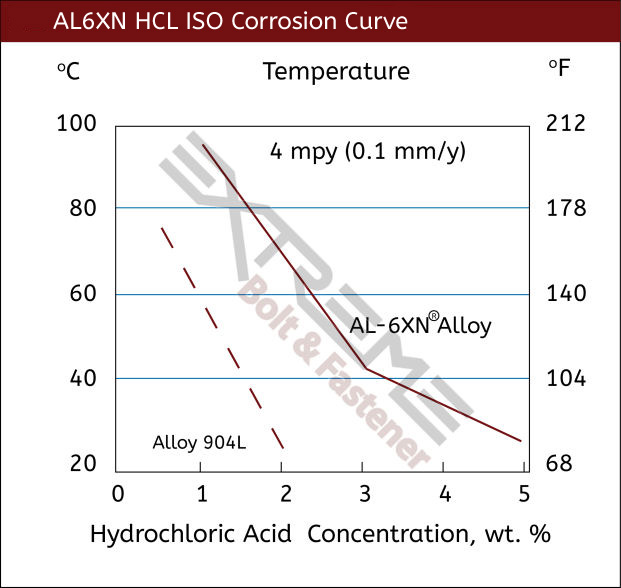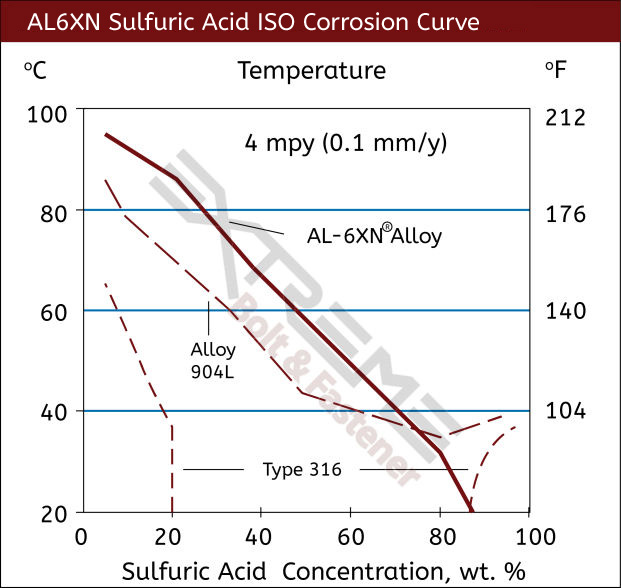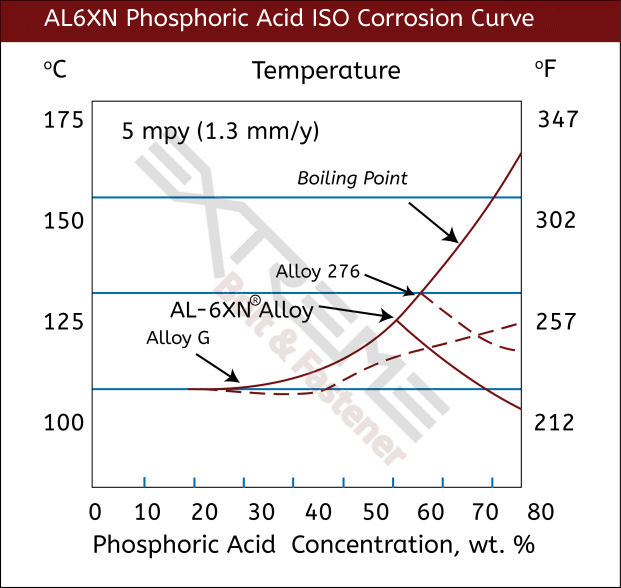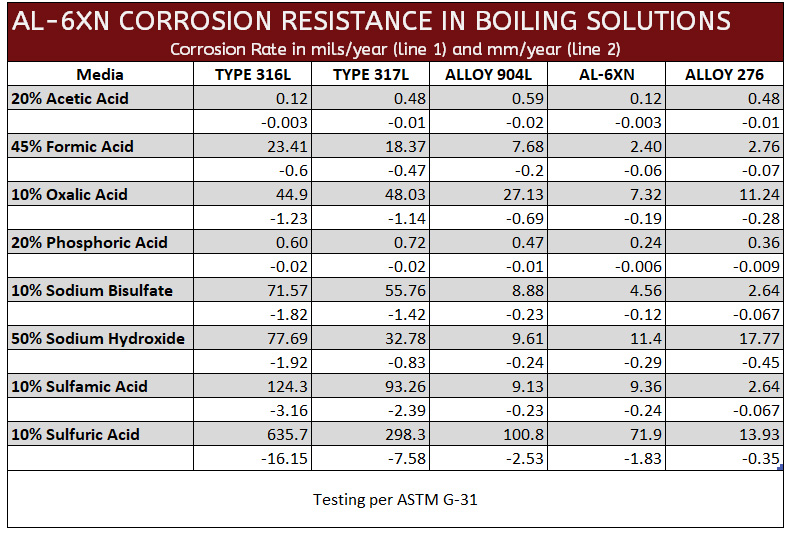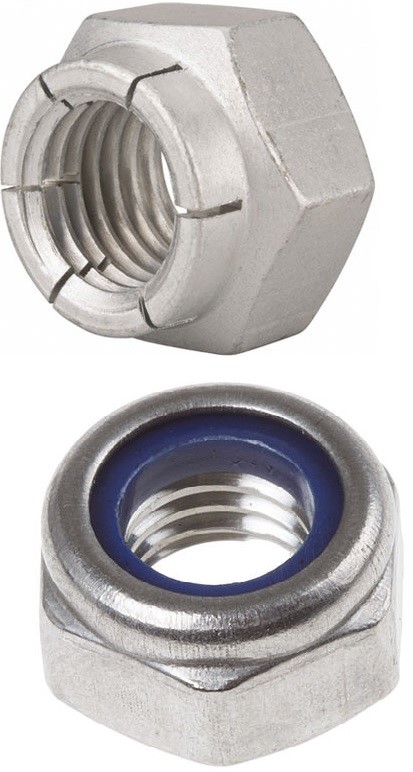A mid-ranged corrosion resistant 6Mo alloy with good strength
- Good corrosion resistance to moderate acids & sea-water
- 50% stronger than stainless steel
- Usable temperature limit of 1000°F
- AL6XN chemistry & specifications
- Lock nut features and benefits
- AL6XN Datasheet
Originally developed to combat sea water corrosion, AL6XN has expanded its role as being good mid-range corrosion resistant alloy. AL6XN lock nuts are a low carbon, high purity, nitrogen-bearing "super-austenitic" stainless alloy. Also considered a 6Moly alloy, AL6XN nuts are similar in chemistry and capabilities to Alloy 926 and SMO 254.With a higher nickel and molybdenum content than Duplex 2205 and Super Duplex 2507, it delivers better corrosion resistance while giving a more cost effective alternative to nickel super alloys like Inconel or Hastelloy in moderately corrosive conditions.
Corrosion Resistance
• Moderate general corrosion resistance
• Excellent chloride / salt water protection
• Good performance in phosphoric acid
• Moderate resistance to nitric acid

Chemical Resistance
In chemical processes which utilize chlorides, such as paper mills and waste water, stress corrosion cracking (SCC) is a common culprit for 316L stainless failures. Duplex alloys will outlast environments that will cause SCC in 316 stainless, but for more severe low PH environments, lock nuts made from higher nickel content alloys like AL6XN will generally work better. For the most extreme situations, alloys with >45% nickel content like Hastelloy are often considered.
Outstanding Resistance to Salt Water
Seawater is where AL6XN lock nuts outperform so many alloys providing protection to stress corrosion cracking, pitting and crevice corrosion in a broad range of marine applications. AL6XN lock nuts contain a minimum of 6% molybdenum content and it is this addition of molybdenum that provides the greatest protection against pitting and crevice corrosion.
Mechanical Properties
Electrical Resistivity: 535 Ohm-circ mil/ft
Ultimate Tensile Strength: 108 ksi
0.2% Yield Strength: 53 ksi
Density: 0.291 lb/in 3

Chemistry
• High molybdenum content provides enhanced corrosion protection in chloride environments.
• Carbon helps to prevent sensitization during welding
• Chromium enhances pitting and crevice corrosion resistance
• The interstitial strengthening effect of nitrogen gives AL6XN lock nuts good high strength properties
AL6XN Applications
• Desalination plants depend on AL6XN lock nuts for the salt water corrosion protection
• Pulp bleaching equipment and piping
• The power industry uses AL6XN lock nuts where salt water and chlorides are present such as steam surface condensers, supercritical, high pressure, feed water heaters, steam surface condensers, flue-gas desulfurization equipment and in nuclear power water piping
• Offshore
• Chemical Processing - processing tanks, vessels and pipes as well as plate and frame heat exchangers.
Resources: AL6XN Torque Specs
AL6XN Locknut Features and Beneifts
An AL6XN locknut resists loosening from vibrations and torque. One of the most common styles is a prevailing torque locknut. This kind of AL6XN locknut has a prevailing torque feature which deforms elastically, preventing it from freely spinning like a standard nut.
The two most common and reliable forms of prevailing torque locknuts are the flexloc style and the polymer insert lock nut. A AL6XN flexloc nut is all-metal in composition with a segmented collar that creates six “locking fingers,” that act as a spring. AL6XN polymer insert lock nuts are often referred to as nylon insert locknuts, although various high performance polymers can be used for the screw threads to “bite into.” Both flexlock and polymer insert locknuts are available in both hexagonal and 12 point configurations.
All Metal Flexloc Lock Nut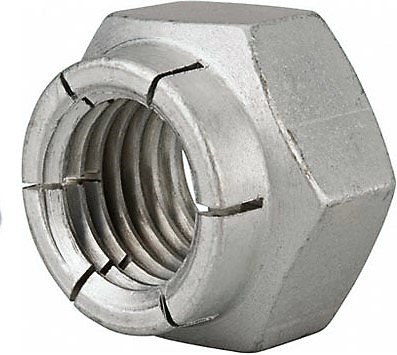 | 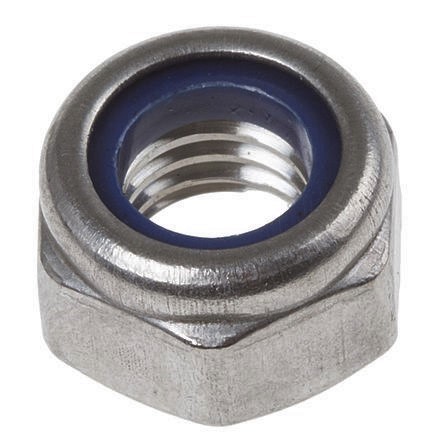 Polymer/Nylon Insert Lock Nut Polymer/Nylon Insert Lock Nut |
|
|
Other all metal lock nuts available include the AL6XN stover and elliptical styles. Though these styles are often a cheaper initial cost, they are less reliable than the flexloc style. As these styles delivering less prevailing torque cycles and often result in more failures, the flexloc style is a better investment for both reliability and cost savings.
AL6XN Chemical Composition & Specifications
AL6XN Specifications: UNS N08367, ASTM A 240, ASTM B 688, ASME SA-240, ASME SB-688, ASTM B690, ASTM B691, ASTM A240, ASTM B688, ASME SA-240, ASME SB-688

AL6XN Mechanical Data
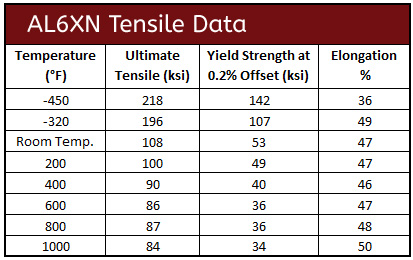
Corrosion Curves for AL6XN
